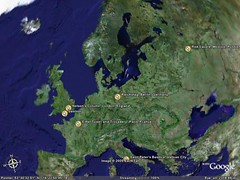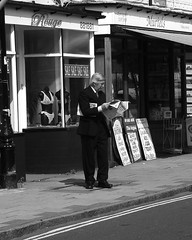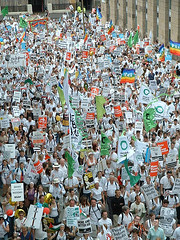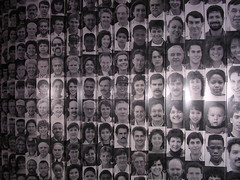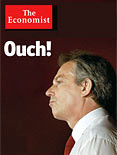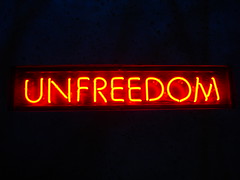Wednesday, September 28, 2005
Being Finnish
That brings me to the subject of identity. And to be more precise, being Finnish. I finished during the weekend a PhD of a friend of mine, Vesa Mauriala. He wrote about the poet movement called The Fire Bearers (Tulenkantajat) and the emergence of modernity in Finland in the 1920s and 1930s. It was incredibly interesting and easy to relate to.
The poets made trips to Paris and Nice and saw the wonders of the big world. Some of them truly fell in love with industrialisation and the feeling that everything is possible. And at the same time there was the spiritual connection to the Finnish nature (see pic).
There is a quote from one of them, Olavi Paavolainen, in the book. He was with Katri Vala in the opera of Monte Carlo. Paavolainen was overwhelmed by the feeling of sitting among the high society of Europe and being allowed to be there. I still get that feeling at times. To me being Finnish is like living on the border of wilderness and village.
Monday, September 26, 2005
I turned out to be a Democrat
| You are a Social Liberal (70% permissive) and an... Economic Liberal (21% permissive) You are best described as a:
Link: The Politics Test on Ok Cupid |
Friday, September 23, 2005
I (just realised that I) have a dream
Rifkin's message is as follows:
- The American dream is not doing too well
- Europeans have always had a dream but they haven't been aware of it
- Even with all its problems the European Union is an achievement one should be proud of
- There are clear differences between the dreams. We should learn from each other
- While the American concept of freedom is about autonomy, on this side of the Atlantic the same phrase refers to quality of life, inclusion and building peace
- By combining American personal accountability and optimism with European inclusivity and solidarity we would achieve a better world
I must admit that I was quite sceptical on the way to the event. I found it a bit too easy to come and praise to the believers. But I genuinely liked Rifkin. He is a magnificent speaker. He knows his figures, he is not a one-liner speaker, he is amusing and also critical towards Europe. He is not like Michael Moore who gains popularity by mocking his nation.
Rifkin's best feature is optimism. He was very correct when pointing out that Europeans should have more self-esteem in their project. The achievements on this continent are unique in world history. The European Union is the biggest experiment ever of a political union not created using violence.
Of course he generalises, speaks mostly about Western Europe etc. It is all so easy to show the weak points in his message. But then you clearly miss the core: Europe is something you can be proud of. One should not be arrogant but value what we have achieved.
Rifkin also managed to show the weak points of Europe. It was refreshing that he was not talking merely about economics but also about literacy, poverty and quality of life. He is a preacher of caring and solidarity. Rifkin stated that we need to create incentives for fertility (better parental benefits) and multiculturalism (we need to make the new Europeans feel welcome). He asked - with no irony - why the old Kennedy slogan with slight modification could not work here as well:"Don't ask what Europe can do for you. Ask what you can do for Europe." I really liked his suggestion that there should be incentives for us - the ERASMUS generation - to spend time working for the community.
In the end someone asked him the obvious question:"Mr. Rifkin, all this is nice but how shall we do this?" I liked the fact that he answered by talking about the dream. He also looked the young man asking the question in the eyes and said that the solution is up to you.
As a friend of mine said on the lift after the lecture:"This is the book that should be in hotel rooms across Europe."
Thursday, September 22, 2005
Please do not call us
I went to Google and wrote ´european parliament telephone number´. I found a BBC article on the new website with the following quote:
"But one curious feature of the old website is reproduced in the new one - you still do not get MEPs' phone numbers, only their faxes.
Here is a secret they do not publicise. All MEPs' fax numbers, in their Brussels offices, begin +322 284 9***; their telephone numbers are identical, except for that 9 after the 284, which must be changed into a 5."
I understand that you do not want every single citizen calling you but this is relatively near to absurd.
Wednesday, September 21, 2005
The art of provocation
Well, as it happened, our film was about the same subject: Todd "Happiness" Solondz's Palindromes. Not to reveal too much of it, it is a story of a teenager called Aviva who goes through teenager pregnancies, abortion clinics and pedophilia in a very Solondz-like manner. It plays with the controversial subject in the same way as von Trier did with racial inequalities in Manderlay. But to Solondz's benefit I have to state that the closing scene of the film shows that there is a certain morale behind the film.
Based on previous Solondz works one could expect absurd black humour. In this film the topics under fire are religion, pro life campaigners, over caring parents etc. Ellen Barkin, Sharon Wilkins and Jennifer Jason Leigh do magnificent roles in this film.
I actually liked this one far more than the irritatingly underlining "here comes the shocking scene" Happiness. With his repulsive means Solondz manages to make a firm statement.
Monday, September 19, 2005
The beauty of text
It also reminded me from my position, I mean being in between. A discussion on the last evening clarified once again what is my personal motivation for journalism. I was having drinks with two of the participants. One of them works on the daily news desk while the other works more on features and reportage. The one from the news desk described how the passion for the work comes from meeting deadlines, getting facts right and being able to fill the page every day. The one working for the features desk told how he loves analysing amounts of information, drawing conclusions, improving his own text and so on.
I clearly belong to the latter group. I have never worked for a news desk. I described during the discussion how I wrote recently a big article on Tony Blair which meant reading his 750-page biography, a 250-page rhetorical analysis on him, doing two interviews, going through dozens of interviews and in the very end squeezing this into 3-4 pages of text. It was a process of 3-4 weeks. For me being a journalist is often quite close to the identity of a researcher.
Tuesday, September 13, 2005
Make Campaigning History
Today´s The Independent informs that the British media watchdog Ofcom has decided that the campaign is too political to be aired on television. According to The Independent, The Communications Act 2003 defines "political ends" as campaigning to bring about a change in the law or to influence the policy of the United Kingdom or foreign governments. The Independent continues:
Ofcom said: "We have reached the unavoidable conclusion that MPH is a body whose objects are 'wholly or mainly' political ... MPH is therefore prohibited from advertising on television or radio". It added: "While the eradication of world poverty may not itself be a matter of political or industrial controversy or current public policy, the manner in which it is achieved could certainly be considered to be so".
I just do not understand. What is the point of this sort of legislation? Raising public awareness is prohibited by law? And my opinion is not based on the fact that I support the campaign. Why is selling an idea or mobilising people worse for a democratic society than marketing an ice cream? It´s not like our societies would not need some shakeup. And why is it so bad to criticise the government on ads? I just do not get this.
Sunday, September 11, 2005
Multiculturalism
A colleague of mine (non-Dutch) wrote an excellent opinion article recently to the Dutch newspaper NRC Handelsblad about the Dutch citizenship ceremony. The new Dutchmen and -women received t-shirts and cheese with small Dutch flags. She questioned - in my opinion rightly so - if this is really what the society wishes to communicate.
Integration and multiculturalism is one of the most difficult discussion topics I know. It is difficult to say something that would not sound superficial, would not be repeating someone else's thoughts or could help in solving the real problems. And I still have the question of von Trier's Manderlay in my head: how strongly should we impose our values and ways of living on others?
For me one of the best discussions on the subject lately has been one at work where we talked about otherness and sameness. The question was which comes first when you enter a foreign country. I believe that you start from the notion of otherness and difference and then - maybe - later experience some feelings of sameness.
Why do I write about this? Because I found an article that really was an excellent, non-emotional and pragmatic approach on the subject. Those who have been following this weblog are not surprised that the text comes from Britain. One of their leading thinkers on this subject, Lord Bhikhu Parekh, stresses in an article for Prospect (unfortunately not free of charge) the importance of emotional commitment from both sides. This article is definitely worth reading. He states that it is not like the immigrants would be the first signs of difference and heterogeneity in our Western societies. "In principle no more and no less can be demanded of them (immigrants) than of their fellow citizens. To demand more is to place a greater burden on them, to demand less is condescending."
Thursday, September 08, 2005
Dance, boy!
I am sure I am not the only one who enjoys watching people dancing in clubs or such. Some people are just hilarious. I remember once observing this guy on the Tallinn ferry dancing in a way that didn´t have any link to the rhythm of the music. Hi-la-ri-ous.
That´s why I enjoyed this Motorola/Cingular promotion site so much. Is there anything as funny as middle-aged people dancing pop?
Wednesday, September 07, 2005
The Economist is my inhalator
I just realised something. I read a blog of a friend of mine and she was talking about New Orleans. She wrote that she "has been following New Orleans".
I know what happened there. It is tragic. But I live at the moment in a foreign country, with inadequate linguistic skills to follow Dutch media, without an Internet connection at home and without television. I have no idea what goes on in the world. Well, that is a slight exaggeration. But I see the world through the news bulletins of Helsingin Sanomat and - yes - through The Economist.
The Economist is one of the best magazines I know. I read it at the gym. The world neatly packaged in 100 pages with a slight flavour of extreme liberalism.
It is usually delivered on Saturdays and I read it through on Monday and Tuesday. So that means I am decades behind the online world. At work I rarely have the time to watch news from the web.
Hmm.. I need to sharpen up. My landlord has promised that I will get an Internet connection to my room this week. That means that in no time I am back in business. But I must admit, I still miss the possibility of reading a newspaper every single morning. I miss the paper more than I miss tv news. Call me oldfashioned, I don´t mind.
p.s. Excellent emotional opinion article by author Anne Rice, born and raised in New Orleans.
Tuesday, September 06, 2005
I love my music
I spent yesterday in bed listening to music. I realised again how wonderful music I have on my iBook. Here are some of the real jewels among the 3.000 songs:
Carole King: Song of Long Ago. "Here is a lamp I left unlighted, aren´t you someone I should know." I adore Carole King. This song is top of the class because of the way her voice breaks in the ´laaa´.
Elton John: Rocketman "I think it´s gonna be a long long time til touchdown bring me round." Ultimate homesickness song of being alone in space.
Marvin Gaye: What´s Goin´On? "War is not the answer." Just the mood of pacifism and the feeling of being confused.
The Cardigans: Lead Me Into The Night. "I´ve been blinded by glitter and gold, my eyes need to rest from this light and sleep well at night." When things just are going too fast.
Stevie Wonder: Heaven Help Us All. "Lord here our call when we fall" Same reason why I like Pave Maijanen´s Pidä huolta. Nearly naïve concern.
Ana Belén: Los Cuatro Muleros. A poem of Lorca. Don´t understand a word but the lightness of the song is out of this world.
Lisa Ekdahl: Jag vill bara vara. Whispering and divine. The beautiful language called Swedish.
Rufus Wainwright: Dinner At Eight. "I´m going to break you down and see what you worth to me." I admire the way he opens his life to the listener.
Tori Amos (see pic): Crucify. "Nothing I do is good enough for you." Ultimate angst song.
Sunday, September 04, 2005
We Belong Together
I love the shop. I came out with a gigantic bag of tea, spices, noodles, curry paste and things like that and spend only fifteen euros.
In the shop I realised that there is still a lot to do in my attitudes. I told on Friday to my Dutch friends that one of the most positive things in the Netherlands is the fact that you can be non-Caucasian and still be seen as Dutch. Definitely not the case (yet) in Finland. In the shop I noticed that I still need to broaden my mindset: I was surprised because the woman in the Chinese supermarket spoke fluent Dutch. Shame on me.
Well, the theme continued in the evening as I went to the cinema to see Lars von Trier's Manderlay. It is the second episode of his America trilogy (first one was Dogville). The film was disturbing. To put mildly.
The film deals with slavery. von Trier states that America was not ready for equality of races and the blacks were not ready for freedom. I still do not know what to think of the film. One of the leading actors, Danny Glover, told in an interview for Image that he refused to take the role after the first reading. He plays an old house slave defending slavery. The film is as anti-Bush as possible. von Trier shows how the world police ends up in paradoxical situations when pushing the people towards its ideals using the main characted Grace as a tool for carrying this message. I am not sure whether one should be impressed by von Trier's bravery or what. Glover says in the interview that Hollywood has avoided making films about slavery excluding showing the liberating end of it. After seeing the film I understand why it was difficult to find an American distributor.
p.s. I have forgotten to mention an important issue in my blog. It is for Finnish men. An open declaration stating that you will not put up with violence against women and that you recognise that it is a serious problem in our country. Many men have already signed it. You should too.
Saturday, September 03, 2005
Is this Apple rotten?
A few months ago my iPod broke. Or to be more precise, I broke my iPod. I dropped it at the gym. Result: it didn't charge anymore. I called the Apple helpline and they told me that it must be the battery and changing that would cost me 150-200 euros. Let me remind you that the iPod itself cost 300. I told them their pricing does not make any sense. Result:
"Well, uh, there is this other option. There's still guy who fixes iPods in the Netherlands. Of course we take no responsibility over the repair."
"So what would that cost?"
"Approximately 20-30 euros."
I contacted iPod Repairs a while ago and travelled yesterday to Bussum for getting it fixed (25 min by train). Result: one wire was loose and it is working again. I paid 10 euros.
I am an Apple fan. Still I am slightly irritated by a logic where they make no repairs and basically ask you to buy a new one. Of course one could say that their policy creates jobs for entrepeneurs but for instance this entrepeneur works in a way that he buys iPods, breaks them into pieces and uses the parts for repairing.
I am extremely grateful for this guy for this service but this episode made me slightly more critical towards the Saint of Computer World (smaller, creative, independent yah yah). Oh, Apple sold approximately 5 million iPods last Christmas.
p.s. Service society: A Green party friend of mine said once that Amsterdam is a wet dream of all Green parties. The Finnish Greens have been talking for years about a service society, i.e. possibility to buy help. Well, that's what I love in the Netherlands. Like this guy who fixed my iPod for ten euros, like the people who fix the tire for my bike for six euros, excellent Chinese takeaway food for six euros etc. I don't feel like I am ripping anyone off and at the same time the prices are such that anyone can afford them
Thursday, September 01, 2005
Strong argument for public broadcasting
I returned on Sunday from a seminar in Sweden on youth tv. The seminar was mostly attended by public broadcasters, which meant the lack of resources was an obvious topic for dinner table and workshop discussions. The role of public broadcasting has been under criticism or evaluation in a number of countries lately.
I believe in public broadcasting. Let me explaing why using a few examples.
The Finnish broadcaster YLE showed last year a tv series on a hot topic in Finland at that time, i.e. why children with good backgrounds commit crimes. As I wrote in my critique then in Helsingin Sanomat, I think that programmes like Nollatoleranssi (Zero Tolerance) are strong arguments for public broadcasting. We need critical analysis on our society. This in addition to plans like the one´s of BBC of having more on-demand material and easier access to archives are good motivations to have public television alongside the commercial ones.
My latest boost for pro-public broadcasting feelings is a result of my visit to Sweden. The Swedes I met all mentioned a series called Kommissionen (The Commission).
It is a fiction series on a terrorist attack to Stockholm. I just watched the trailer and it seems superb. Shocking and emotional.
I knew already that SVT (Swedish public broadcaster) knows how to do tv, but the quality of this seemed amazing. I am strongly considering ordering it on dvd. It seems like it strikes straight to the point, showing the true face of politics of fear. Well done.


